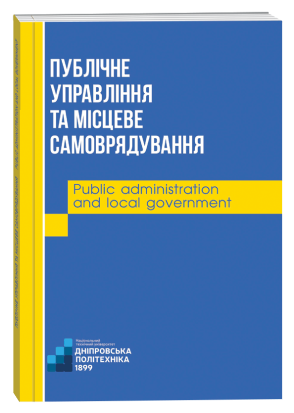INTEGRATED SYSTEMS OF PUBLIC ADMINISTRATION 3.0: TRANSFORMATION OF THE CONCEPTUAL MODEL OF THE DEVELOPMENT OF THE NATIONAL DEVELOPMENT STRATEGY
DOI:
https://doi.org/10.32782/2414-4436/2023-3-9Keywords:
adaptation, power, state administration, public administration, reformation, system, transformationAbstract
This article aims to analyze the development of the integrated system of public administration over the fifteen years of formalization of this term in the domestic science of public administration. The obvious task is to study the possibility of modern state (public) administration to act as a platform for national development, to form the latest model of state formation in the conditions of external challenges. The modern foundations of the transformation of social relations in Ukraine, the development of new legal mechanisms for the implementation of the provisions of the Constitution of Ukraine, the implementation of administrative reforms in Ukraine, armed aggression against Ukraine and the local fragmentation of regional management systems have made and continue to make significant changes to the content of state management activities, the formation and implementation of mechanisms regulation of the activities of authorities. At the current stage of the development of society, the goal of administrative and legal regulation is not only the improvement of the forms and methods of management activity, the establishment and regulation of relations between citizens and state institutions, when every person must be guaranteed the real observance and protection of rights and freedoms, the effective protection of these rights and freedoms in cases their violations. In fact, the new social reality sets the task of the functioning of a universal organizational and legal mechanism of identifying, coordinating and realizing public needs and interests based on the use of various legal means, the formation of subjective rights and obligations of participants in social processes, and the transfer of their connections and relations into specific legal relations. In the conditions of armed aggression against Ukraine, the topic of special management regimes, non-standard administrative procedures, and a new format of stateservice relations is being updated. Achieving high efficiency and quality of any type of management activity consists in rational legal provision of management. After all, only the public-legal regulation of the behavior of subjects and objects of public administration, which is carried out with the help of organizational-legal regulation, is able to ensure the coherence and purposefulness of their activities, oriented to the satisfaction of public needs and interests, which objectively exist at a specific stage social development. The peculiarities of modern public administration actualized the need to introduce the concept of "integrated system of public administration" as a terminological concept. The concept of an integrated system of public administration (ISPU) is defined through power and authority. An integrated system of public administration should be defined as a system of public administration within the framework of the implementation of state and selfgoverning administrative powers in accordance with the Constitution and laws of Ukraine, which is able to adapt to changes in the external environment and, accordingly, to change (transform) the qualitative characteristics of the elements of the system, and the adaptation process itself is decisive provides a synergistic effect. So, we are not talking about a completely new type of system, but about the formation of a national management system that combines the activities of authorities at different levels with the necessary level of administrative flexibility, and it is the combination that ensures the management result. Significant advantages of the implementation of ISPU consist in the possibility of transition to a fundamentally new type of relationship without destroying hierarchical relationships between management levels. At the same time, the internal characteristics of such relations are subject to change in the context of standards, rules and procedures proposed by both internal and external entities. That the main criteria of the political organization of society are the obligation of internal orderliness and organization, optimization of the activities of political parties as subjects of social policy, recognition by political parties of the principles of democratic consensus, the formation of civilized public-authority relations. The methodological approach to researching the process of reforming public administration involves determining the need to introduce the concept of "integrated public administration system" (IPAS) as a terminological concept of the science of public administration. IPAS should be considered as a system of public relations within the framework of the implementation of state and self-governing administrative powers in accordance with the Constitution and laws of Ukraine, which is able to adapt to changes in the external environment and, accordingly, change (transform) the qualitative characteristics of subsystems and elements of the system, and the adaptation process itself – as such that decisively provides a synergistic effect. It is about the formation of a national management system that integrates the activities of authorities at different levels.
References
Баштанник В. Структурні характеристики та тенденції організаційного розвитку національних систем публічного управління в умовах сучасних євроінтеграційних процесів. Вісник НАДУ. 2009. № 1. С. 5–16.
Баштанник В., Серьогін С. Консенсусна демократія в інтегрованих системах публічного управління: європейський досвід та Україна. Актуальні. проблеми державного управління. 2007. № 2. С. 3–14.
Зіллер Ж. Політико-адміністративні системи країн ЄС; пер. з фр. В. Ховхун. Київ : Основи, 1996. 420 c.
Про правовий режим воєнного стану : Закон України від 12.05.2015 р. № 389-VIII URL: https://zakon.rada.gov.ua/laws/show/389-19#Text (дата звернення: 21.10.23).
The new handbook of organizational communication: advances in theory, research, and methods / Fredric M. Jablin, Linda L. Putnam, editors. – Thousand Oaks, CA; London ; New Dehli : Sage Publications, 2001. – XXXI, 911 p.






